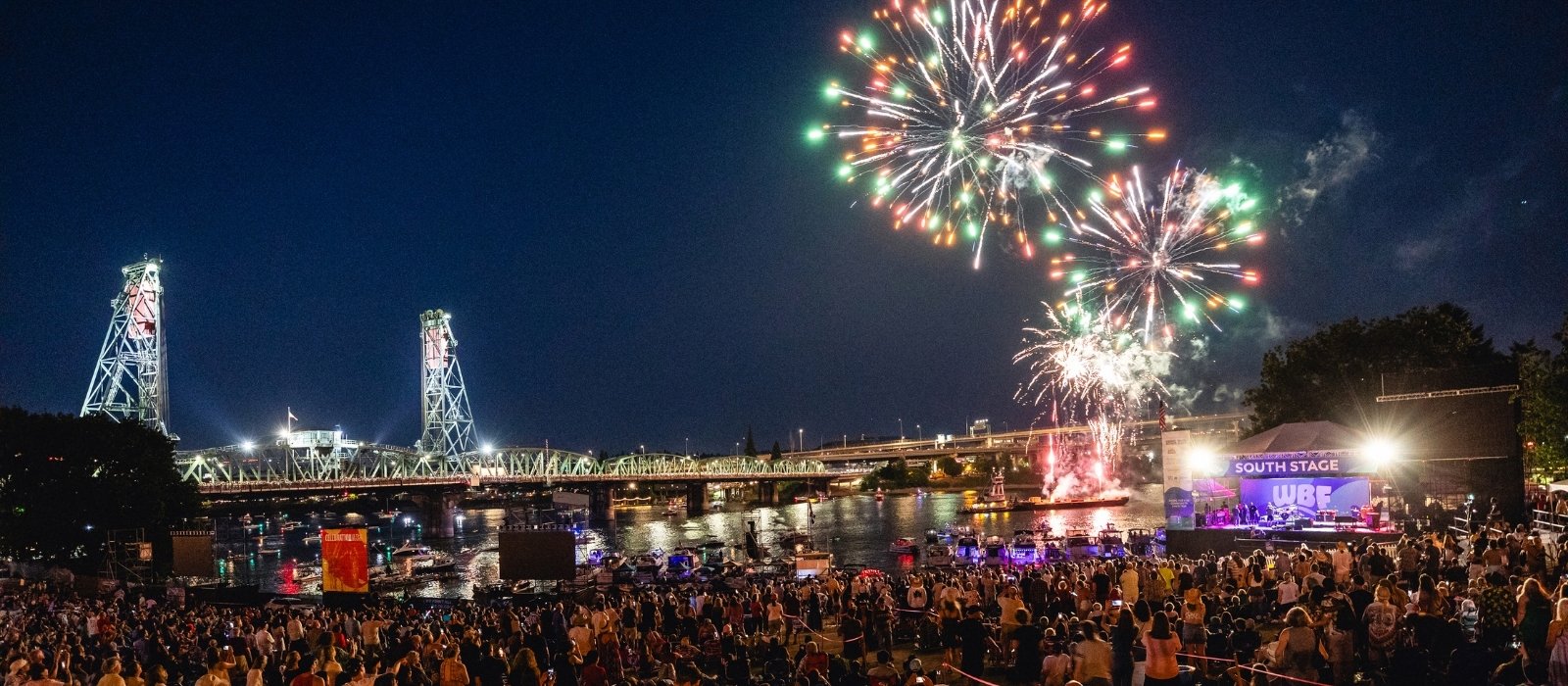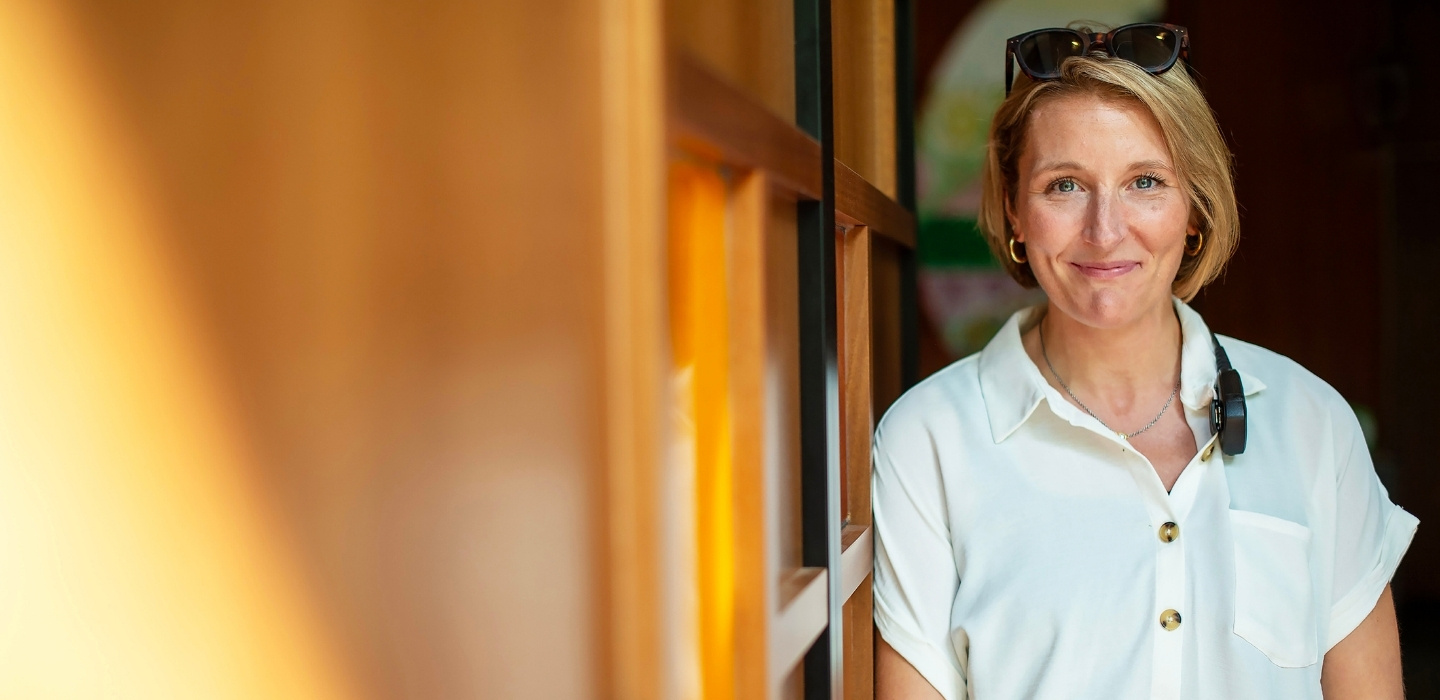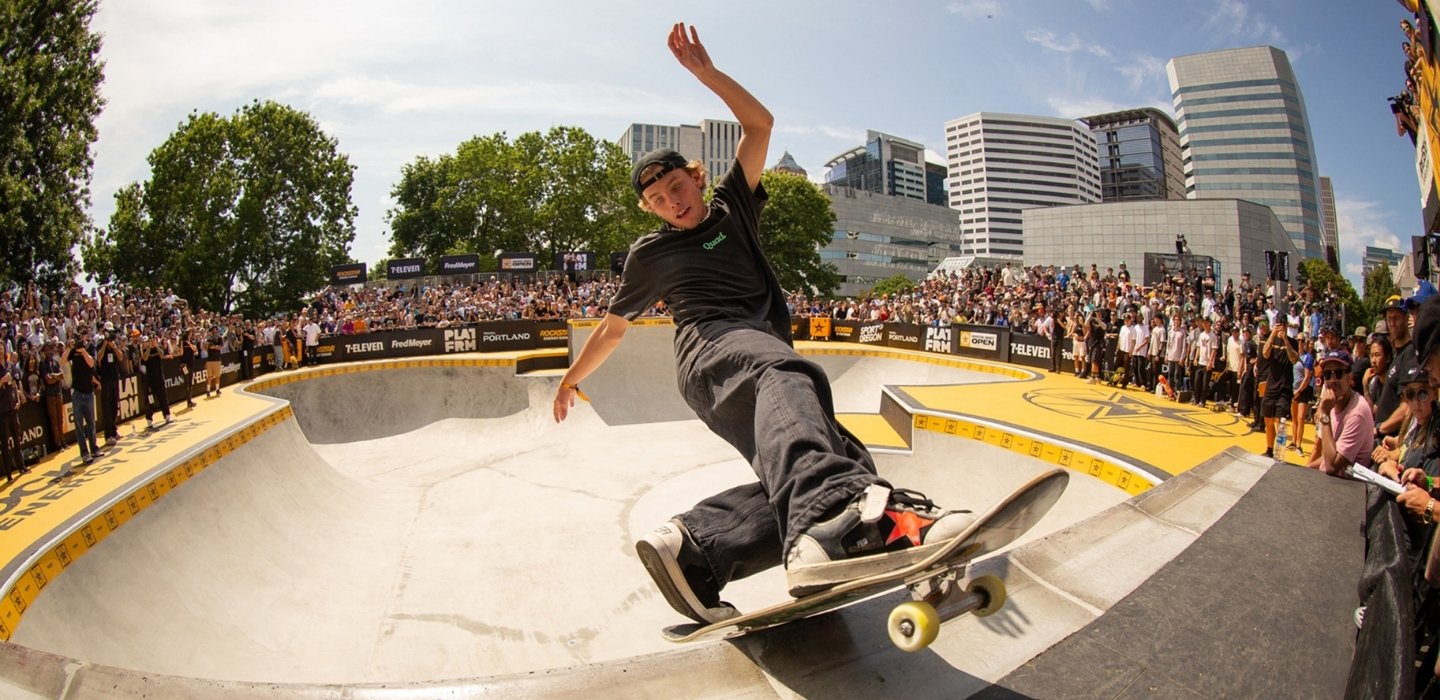SUMMER 2025
The Art of Gathering
If you’ve been to a music or wine or beer festival in downtown Portland over the past 10 years, chances are you’ve had an experience orchestrated by Christina Fuller ’07, ’12.

Photo courtesy of the Waterfront Blues Festival
CHRISTINA FULLER CO-OWNS Fuller Events, an event production company that specializes in large-scale outdoor, mostly public events. She got her start planning the Portland Rose Festival through an internship while she was at University of Portland. And from that point on she was hooked on creating live events and experiences for people. She has planned Hood to Coast, events for TEDxPortland, the Waterfront Blues Festival, Portland Pride Festival, and Rockstar Energy Open, a skateboarding festival that started last year and will be back this summer, among many others.
She sat down with Portland magazine to talk to us about her work philosophy, the challenges of today, and how she sees her work through a lens of service.
WE ALL KNOW THAT IN-PERSON EVENTS TOOK A HIT DURING THE PANDEMIC. HOW DID YOU WEATHER THAT STORM AND THE AFTERMATH?
The pandemic—no surprise—threw a wrench in everything. By state order we weren’t allowed to gather in groups larger than a certain size. This pulled business to a halt. Downtown went silent, and it went into a place of deep hurt. It was heartbreaking. We work in public spaces, primarily in downtown Portland, and so that was our home turf.
It took a while, but conversations started shifting both from public and private leaders. They started asking: How do we move forward? What does downtown Portland do from here? And they started looking at events and festivals and the arts and saying: You’re actually bringing people downtown. You make people’s hearts feel good, you give people pride in the city that they live in. We’re not yet sure how all of the other pieces will come together. There are complicated solutions needed for the major problems in our community, but what you’re doing is working.
They can see that we need more events like the Waterfront Blues Festival to drive people downtown and show us that Portland is still beautiful. The festival is still nestled right alongside the river, and we’ve got Mount Hood in the distance—that hasn’t changed. And the folks that live here want to gather together. Yes, we’re all a little changed from the pandemic, but maybe we’re more grateful for these gatherings, and more intentional about supporting them.
Thankfully, conversations are still very much in motion around supporting the work we do, noting the economic impact of it and the role that these large events play for reputational recovery for our region. When you talk about a city’s need for bridges, streets, and basic infrastructure, I make the argument that arts and events are infrastructure, too. And infrastructure is not a nice-to-have, it’s a must-have.
Over the course of a weekend, not only are events putting people in hotels, but we’ve got restaurants, bars and parking garages, and Uber and Lyft—all kinds of adjacent but really important economic pieces that add up to millions of dollars. It’s significant, and it’s really good business. Events are a win-win—they’re good for business and they’re good for the community.
WHAT IS IT ABOUT LIVE, IN-PERSON EVENTS THAT HAS DRAWN YOU TO THIS WORK?
We’ve often heard people talk about how Portland’s Waterfront Park is “the church” of Portland, and that it just opens its doors for different community members. Over different weekends, over the entire summer, you’ll find different congregations there to celebrate. I’ve gotten this amazing orientation, not only to Waterfront Park by essentially living there through work, but by being exposed to so many cultures and communities that are celebrating and gathering around events.
It has been very meaningful to serve in this role—in the city of Portland and beyond—to be a connector and organizer and community builder through these gatherings. It’s that collective moment of shared experience.
Being at a stadium watching a sports game feels different than watching it at home on TV, right? There’s something about being live and in-person that is palpable and different, and that is where I get so much of my joy and drive. Doing what I do is for that shared experience through the art of gathering, getting people together.

Photo credit: Amanda Lucier
WERE THERE ANY EVENTS THAT WERE SPECIAL TO YOU GROWING UP THAT YOU LOOK BACK ON NOW AS YOU DO THIS WORK?
Both of my parents worked in downtown Seattle. Every Christmas, we would dress up and meet my dad at his office and go out for a fancy dinner and a play. That was a Christmas tradition. And I think calling something a tradition has a kind of power. Traditions serve as an anchor.
There is a certain amount of pressure, which I’ll call responsibility, or stewardship, of doing what I do, because I am carrying people’s traditions, and they are unknowingly allowing me the opportunity to plan their moments of time, which is the most precious thing we have. If they’re willing to give me a day of their time, three hours of their time, a weekend of their summer, that’s a real opportunity and a real responsibility to do my job well, so that it is worth it for them.

Courtesy of Rockstar Energy Open
PRESUMABLY YOU COULD RUN EVENTS ANYWHERE, THE WORLD OVER, BUT YOU’VE MADE A CHOICE TO STICK WITH PORTLAND. WHAT’S YOUR MOTIVATION FOR THAT CHOICE?
I have had people suggest that we could take the Waterfront Blues Festival elsewhere and not have to deal with downtown Portland. And I thought, yeah, we could do that, we could take it to a lake, we could take it to any kind of “waterfront” anywhere. And yet, there was never really a doubt for me about choosing Portland. I think there’s also a little bit of competitiveness in myself where I don’t want to give up on Portland because of what the city has done for me personally and professionally. But also knowing that the city needs champions during its hardest times, and it feels like a unique moment of stewardship to be in the role to make the decision to show back up in downtown Portland, when some folks thought we shouldn’t or couldn’t. Maybe it isn’t a bold decision to some, but it feels bold when it’s your money, your business, and your resources to commit to a place that has challenges. I would still say the upside and the opportunity outweighs the challenges. Portland needs things like the Waterfront Blues Festival and these other legacy events to be a part of the DNA. To show up like this is what Portland is. This is why we love Portland. This is why there isn’t another Portland. It’s the people within it. It’s the group of creative entrepreneurs that are still hustling to do these things, and the champions of culture that don’t want to give up on making sure that people have access to the work that we do.
Portland deserves it.
UPCOMING EVENTS
Looking to get out and explore some festive gatherings this summer? The following are the 2025 summer festivals and events Christina has either run in the past or will be running this summer. You can use these as a starting point!
- Waterfront Blues Festival (July 4 and 5)
- Portland Pride Waterfront Festival (July 19-20)
- Rockstar Energy Open (August 15-17)
- Hood to Coast Relay (August 22-23)
- Leukemia & Lymphoma Society’s Light the Night (October 11)